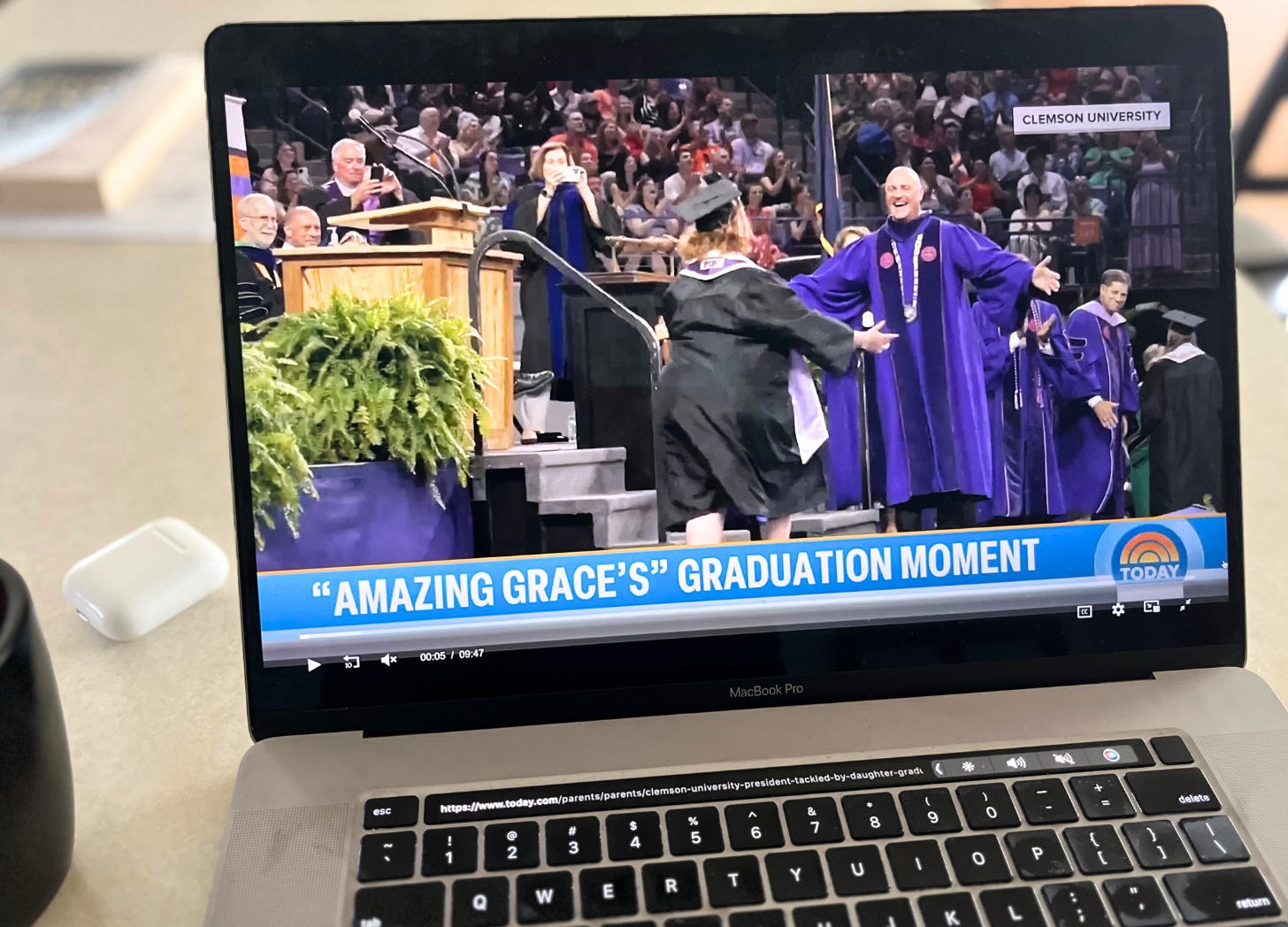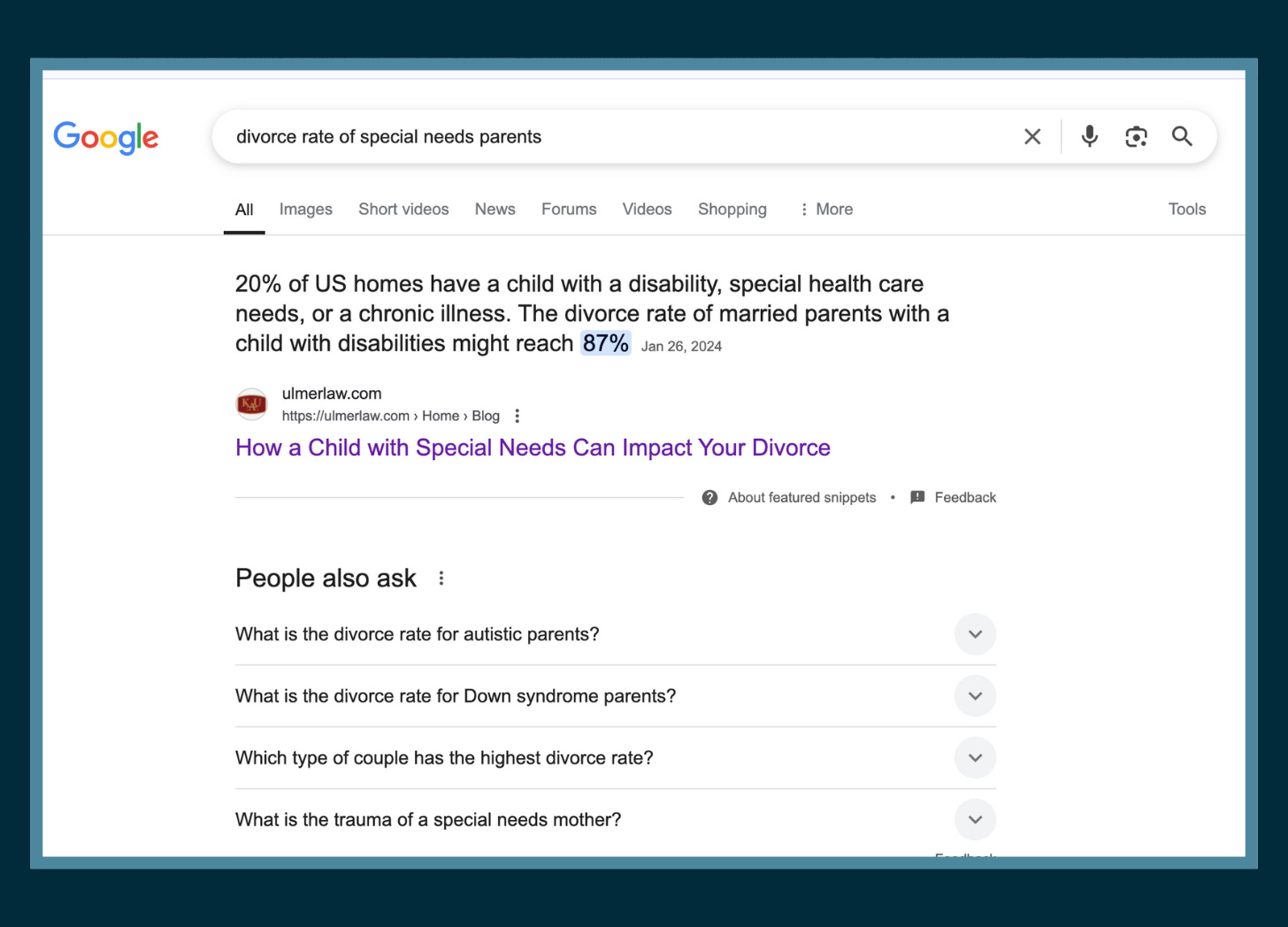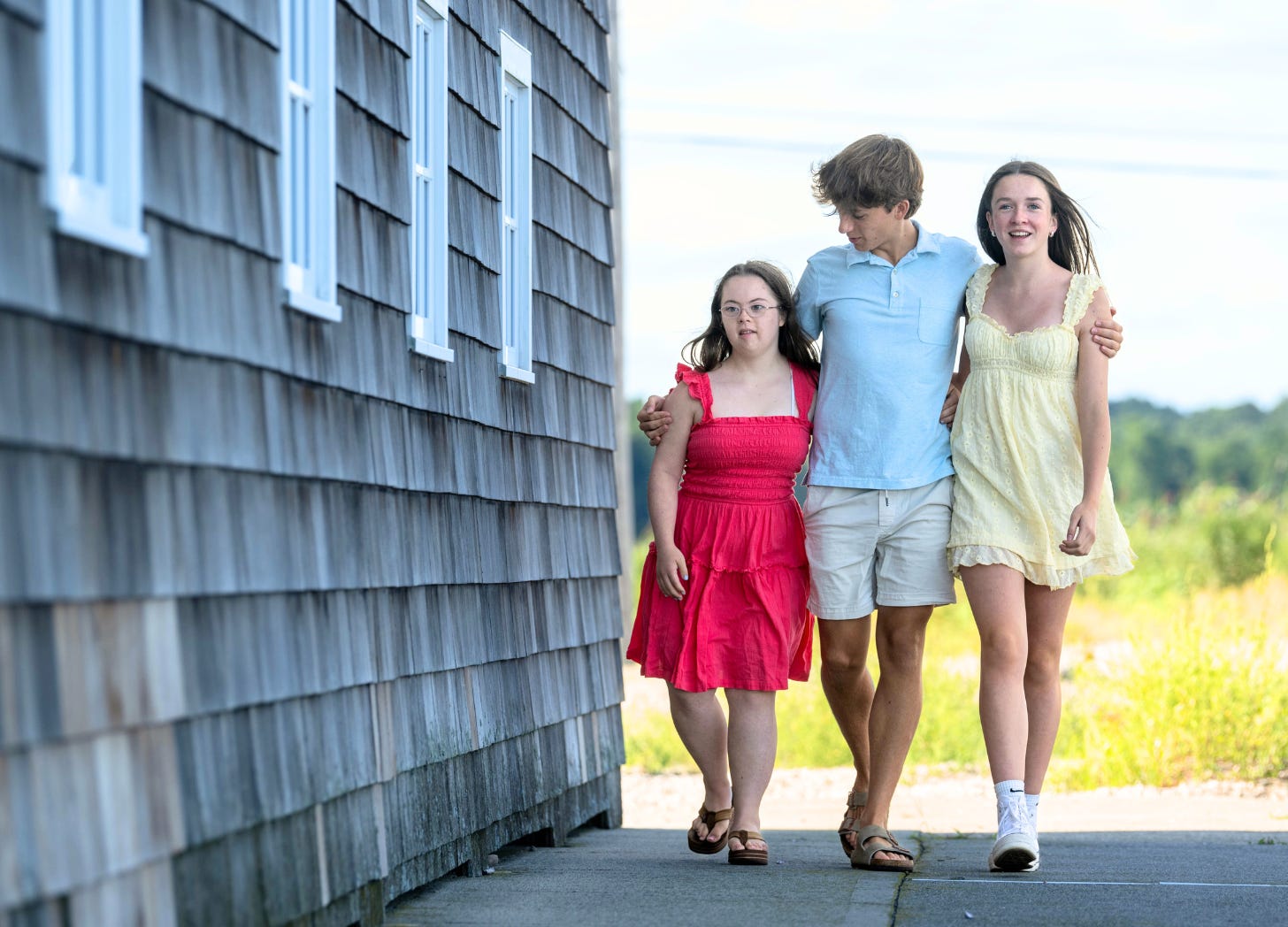Having a Disabled Child Doesn’t Doom a Marriage
Families like ours are told we won’t make it. Hope, data, and love tell a different story. {Plus 1 fun thing and 3 things worth your time}
I watched the viral video of Grace Clements embracing her dad, the President of Clemson University. They tumble onto the stage together and get up for a more subdued, though still exuberant, hug, on the day marking Grace’s graduation from the ClemsonLIFE program. (Penny’s dream is to attend the ClemsonLIFE program, just like Grace.)
I also watched Grace and her parents on the Today Show, and I heard Beth Clements say that “80% of parents of kids with special needs get a divorce.”
When I Googled “divorce rate of special needs parents,” the top result reads:
“20% of US homes have a child with a disability, special health care needs, or a chronic illness. The divorce rate of married parents with a child with disabilities might reach 87%”
Marriage and parenting kids with disabilities can be challenging. That’s true. And yet a deeper dive into the literature reveals a far more complex, and far more positive, story. (If you're reading this and currently facing a difficult challenge, please know that you're not alone. This essay isn't about offering specific solutions to your situation, but I do want to gently encourage you to reach out for support and ask for help where you are.)
The 80% number seems to emerge from a 2023 article in Psychology Today that links to a Special Needs Law essay that references a documentary film about autism. In other words, the source of this information is quite unclear, and it originates only as a comment about families with kids with autism.
More Hopeful Data
A 2015 study by the National Institutes of Health reached very different conclusions about the stability of marriages in families affected by disability, including autism. This study tracked nearly 200 families (compared to a control group of 7,200 families with typically-developing kids) over 50 years. Here’s what they report:
A 2004 meta-analysis of 13 different studies about divorce saw only a slight difference in marriage survival between families with kids with disabilities and families with typically developing kids
A 2007 study found a significantly LOWER rate of divorce among parents of children with Down syndrome than the general population
A 2010 study found that the rate of divorce of parents with autistic children is comparable to the general population, but there is a higher rate of divorce during the adolescent years
Families with more children who include a child with a disability seem to have a lower rate of divorce than smaller families who include a disabled child
The researchers write:
“In conclusion, we found that divorce rates were not elevated, on average, in families with a child with developmental disabilities.”
The Importance of the Stories We Tell
I can’t say for sure why the 80% statistic gets thrown about so often. Maybe it’s simply because of what comes up on a Google search. Maybe it’s because 80% feels so dramatic, and we tend to focus on, remember, and pass along dramatic data. Maybe it’s because well-meaning people want to send out a warning so that parents don’t forget to take care of their own needs, including the need to stay connected to and supportive of each other. Maybe it’s because we as a culture tell a story of disability as a tragedy and a burden, and this statistic supports that story.
I’ve said it before, and you’ll hear it from me again: we need to tell a new—and true and accurate—story about disability. We need to reimagine disability through stories of hope and resilience and limitations and possibilities and hardship and growth, stories like that of Grace Clements and her family.
An Imagination for a Good Life
For nearly two decades, I’ve also been telling the story of our family in public, not in order to hold us up as exemplars, but in order to help shape an imagination for a good life for families affected by disability. Yes, there are hardships associated with the particularities of our family life, and I’m unlikely to share most of those here out of respect for our teenagers’ privacy. But there is also a lot of joy.
Recently, I was taking a walk with William, our 16-year-old son and Penny’s younger brother. I asked him if he ever felt like he needed support in light of having a sister with Down syndrome. “No, Mom,” he said. “If anything, I see it as a positive aspect of my life.”
I asked Marilee, our 14-year-old, the same question. She said, “I don’t really feel like it’s affected me that Penny has Down syndrome. I mean, maybe it makes me more empathetic to people who are excluded.”
Our family is just one example of the reality of marriage and parenting with a disabled child. We are among those who experience gratitude, strength, and growth here. And we are not alone.
If you are in a marriage with a child with disabilities, please know that your marriage can grow and thrive. Your kids can grow up in mutually beneficial relationships of love with one another. Your family can be a blessing to your community.
I’d love to hear from you! Please leave a comment or reply to this email.
Amy Julia
P.S. Keep reading for 1 fun thing and 3 things worth your time!
Reimagining Disability
guest interview on the Becoming Church podcast
I enjoyed speaking with Kristin Mockler Young about what it really means to live a good life, especially after a diagnosis that shifts your expectations. This conversation is for every parent navigating the unknown, for anyone working to unlearn ableist beliefs, and for all of us asking how to become a more empathetic, inclusive community.
1 Fun Thing
I have zero expectations for Mother’s Day. We usually have soccer games, and it falls on a big weekend for Peter’s work every year, so I don’t feel the need for any celebrations. Which only makes it all the more lovely to receive flowers and cards and a walk along a river and dinner as a family.
3 Things Worth Your Time
VIDEO: The Hiring Chain
We hope that Penny will get to be a part of this chain.
ESSAY: “There Are Ways to Die With Dignity, but Not Like This”
Ethicist and doctor Lydia Dugdale explains why medical assistance in dying, at least as currently proposed, harms vulnerable people:
“This is not a compassionate policy — not in Canada, not in Oregon and not, should the bill become law, in New York. Instead of investing in the infrastructure of support for the lonely, the depressed, the disabled and the poor, we offer them a prescription for death. We call it autonomy, but it’s abandonment.”
ESSAY: “In Trump’s America, All Parents and Children for Themselves”
I’ve been trying to organize my thoughts about the problems and injustices embedded within dismantling the Department of Education. Pepper Stetler does a better job explaining it than I could:
“Without a fully functioning Department of Education, states will not be held accountable for meeting even the minimum requirements of IDEA, and this landmark piece of legislation risks becoming essentially toothless, save for civil litigation. We will see an erosion of the promise of a free and appropriate public education for students with disabilities and fewer ways for parents and advocates to do anything about it.”
What about you?
What are you pondering, reading, watching, or listening to these days?
🎙Listen to the podcast Apple | Spotify | YouTube | More
📰 Miss a week? Read past newsletters here.
📧 Questions or feedback? Leave a comment. I read every comment and email reply from you!
As an Amazon Associate, I earn from qualifying purchases. So, if you use a link from here to purchase something I recommend, it sometimes earns me a small commission, which enables me to continue the work I do here. Thank you!










I love this line, Amy Julia: "For nearly two decades, I’ve also been telling the story of our family in public, not in order to hold us up as exemplars, but in order to help shape an imagination for a good life for families affected by disability."
I'm struggling to know how to respond to this, or even if I should, as the sibling of a disabled person whose parents did get divorced. I don't want to sound a note of doom! I do appreciate this encouraging message and I do know lots of parents of disabled children who have healthy, thriving marriages. I will just say, about the siblings--the major difficulty for siblings is exactly what you've unintentionally described here: the subtle, unintended pressure to be the ones without any problems. I'm definitely not saying you are pressuring your abled children in this way. I think it can often come from inside the child themselves, as they desperately want to provide whatever the family needs from them. I certainly wouldn't have been able to articulate that as a teenager. It has taken me several decades to begin to unpack this.